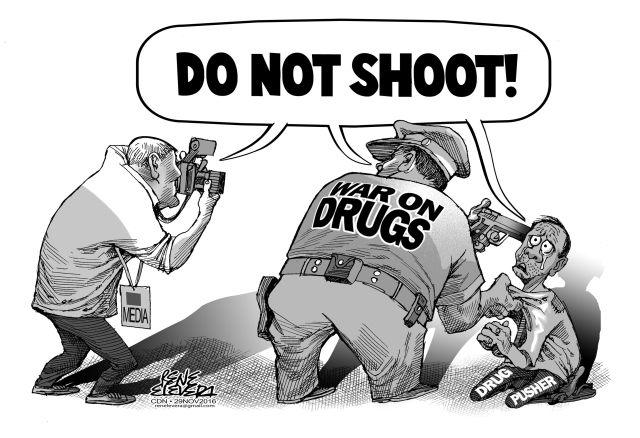
Were there any witnesses to the police operation that resulted in the death of Gener Rondina, whose family including his father retired police officer Generoso Rondina, acknowledged was a suspected drug pusher?
The family insisted that Rondina was unarmed and surrendered to police at his home in Barangay Carreta, Cebu City last Friday. But the police officers claimed that he was armed and engaged their team in a shootout from which they had no choice but to shoot him down.
But based on their sheer number, wouldn’t it have been a tactical advantage for them to have simply crippled or disabled him enough to pin him down and throw him in jail?
It may have been messy and could have endangered the lives of the police personnel but every precaution should have been taken to ensure that the suspect is caught alive, not killed.
But then their marching orders from President Rodrigo Duterte are crystal clear; never hesitate to kill if necessary. The operative word there is “if necessary” and that means if the drug suspect/s pose a substantial threat to the police team sent to arrest him/her/them.
President Duterte had always pointed out that more than one cop is killed due to police operations involving drugs and while their sacrifices and deaths cannot be ignored, it is a cold hard fact that like soldiers, danger is part and parcel of their job description.
Keeping them alive in the line of duty doesn’t mean having to kill the suspect who is unarmed, let alone supposedly surrendered to them.
Gener Rondina may be able to sell several kilos of shabu a week but we have yet to receive word if he is quite good enough with a firearm or weapon as to pose a threat to several police officers armed with guns that can take down more than two armed persons.
We hope that the President’s order didn’t stoke trigger happy tendencies among cops. In trying to serve a search warrant to Rondina, the police team may have considered the possibility of him resisting arrest and could have mapped any means to disable him and prevent him from engaging them in a shootout that could have been fatal to him or some of them.
Instead Rondina wound up getting killed and he was just the latest in a growing line of casualties of police operations involving drug surrenderers who supposedly returned to the illegal drug trade.
With no witnesses and very little evidence to go by, the Commission on Human Rights would be hard pressed to pin down any of the Mabolo police officers to charges that can be filed in court.
So we may have other drug suspects like Rondina fall dead by the wayside, to serve as warning to others who continue engaging in the drug trade while leaving many more families weeping for their losses.